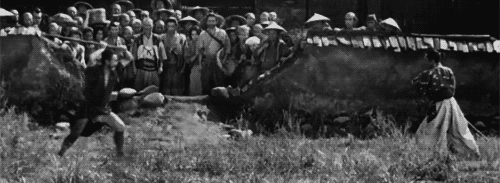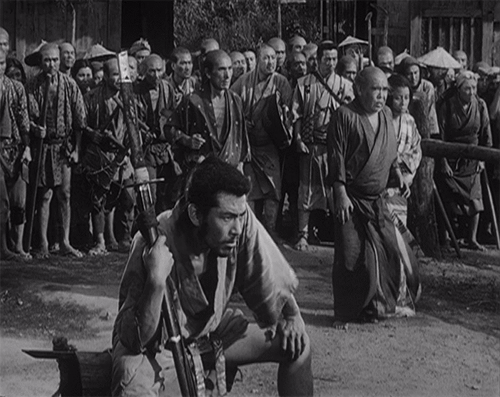Seven Samurai (Shichinin No Samurai) is an Akira Kurosawa masterpiece, directed by one of the most significant filmmakers of all time.

This film, alongside with many other Kurosawa films, have shaped cinema into what it is today and going back to watch this piece of history shows that.
The story of a poor village who recruit seven unemployed samurai to defend themselves from bandits is just as captivating today as it would have been in 1954.
If you look past the weathered and gritty film scan and the technical limitations of the time, the entire film is extremely modern. The most obvious indicator is the outstanding cinematography.

The deliberate use of carefully constructed motion, whether it be actor blocking, camera dollies, cranes; or even the use of wind to move the trees and dust, these are all techniques that revolutionised the very flat history of cinema that came before it.
Kurosawa carefully used cinematography techniques that hold up extremely well today.

There are several moments where the extreme closeup of a character with harsh and moody lighting cast across his face, clever shallow depth of field; and a defeated opponent falling in slow motion had me in awe. It truly felt like this was a fairly modern film that was intentionally shot in 4:3 black and white, akin to Schindler’s List (1993).
Burning buildings, large and epic action scenes and storytelling that has inspired many current directors such as George Lucas, Martin Scorcesse, Quentin Tarantino and countless more.
Speaking of some of these directors, can we have more intermissions in some of our lengthy epics? There’s something special about it when done right (The Hateful Eight 70mm roadshow screenings).

Two particular scenes stood out for me, the first was when Kyuzo (Seiji Miyaguchi) is alone in the forest practicing his sword technique in the pouring rain until he sees something that catches his eye and begins to investigate from afar. Absolute gorgeous imagery!

The other is when Kikuchiyo (Toshirô Mifune) and Kambei Shimada (Takashi Shimura) run to a burning mill through the shallow river. That’s when I began to notice the influence this film has had on not only Japan’s but all western culture in terms of cinematic storytelling.
Direct imitations or inspired elements, Seven Samurai is a film that seems daunting to approach but is nothing other than a smooth ride for anyone that enjoys quality cinema.

